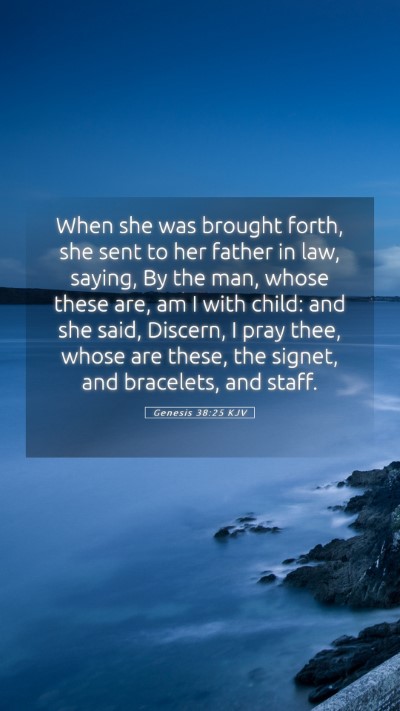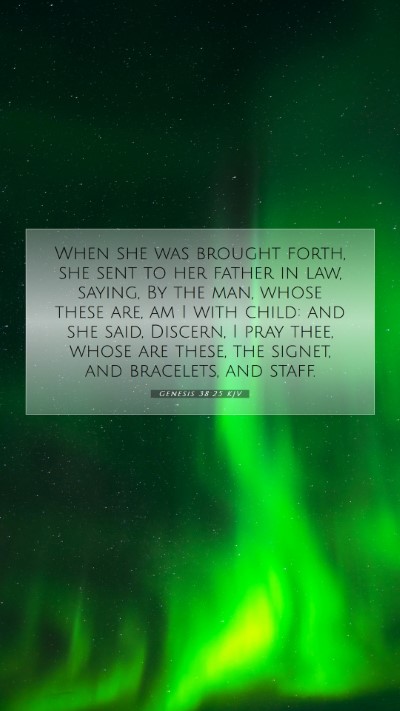Bible Verse Commentary: Genesis 38:25
Understanding the Verse: Genesis 38:25 takes place in a narrative that highlights the complexities of human morality and divine providence. The verse specifically recounts the moment when Tamar, after being wronged by her father-in-law Judah, reveals herself as the pregnant woman by producing her possessions—the seals and the staff. This act speaks volumes about personal justice and acknowledgment of one's actions.
Verse Context
This account is steeped in cultural and historical significance. The patriarchal society of ancient Israel often left women in vulnerable positions. Judah's actions and subsequent judgment reflect the communal norms and the importance of personal integrity.
Commentary Insights
-
Matthew Henry: Emphasizes the themes of justice and the revelation of truth. He points out that Tamar's actions led Judah to recognize his wrongdoings, demonstrating that personal responsibility is vital in matters of morality.
-
Albert Barnes: Focuses on the implications of Tamar's deception as a survival strategy in a patriarchal society. He interprets this act not merely as deceit but as a profound assertion of rightful legacy and acknowledgment of divine justice.
-
Adam Clarke: Analyzes the sociocultural context in which Tamar's actions can be seen as a necessary claim to her rights, thus shedding light on women's agency in the narrative. He also discusses the moral challenges present within the family dynamics of Judah and Tamar.
Key Themes and Insights
This verse encapsulates several important themes that resonate throughout Scripture:
- Justice and Acknowledgment: It illustrates the necessity for recognition of wrongdoing, underscoring how personal accountability plays a role in divine justice.
- Women's Agency: Tamar's actions convey a powerful message about women's rights and agency in ancient biblical times.
- Divine Providence: The unfolding of events points towards God's overarching plan, as even in flawed human actions, God's purposes are achieved.
Application of the Verse
When looking for Bible verse explanations and Bible study insights, Genesis 38:25 challenges readers to consider the nature of justice and the impact of personal choices. Believers can reflect on their own lives, exploring how they respond to wrongs and whether they acknowledge their failings within the community.
Bible Study Groups Discussion
For Bible study groups, this passage can spur discussions on:
- How societal norms influence our understanding of right and wrong.
- The role of women in biblical narratives and their representation.
- The necessity of truth-telling in personal and communal relationships.
Cross References
Genesis 38:25 can be related to several scripture passages that provide deeper insights:
- Deuteronomy 25:5-6: Discusses levirate marriage, shedding light on the duty of a brother-in-law to perpetuate a deceased brother’s lineage.
- Matthew 1:3: Includes Tamar in the genealogy of Jesus, highlighting her significance in salvation history.
- Genesis 49:10: Prophecy regarding Judah, linking back to the implications of this narrative on future generations.
Conclusion
In conclusion, Genesis 38:25 serves as a pivotal verse for exploring Bible verse meanings and Bible verse interpretations. It challenges readers to reflect on moral complexity, human agency, and divine oversight. Such insights are invaluable for both personal reflection and group study, making it a significant component in Bible study resources and Bible study lessons.


